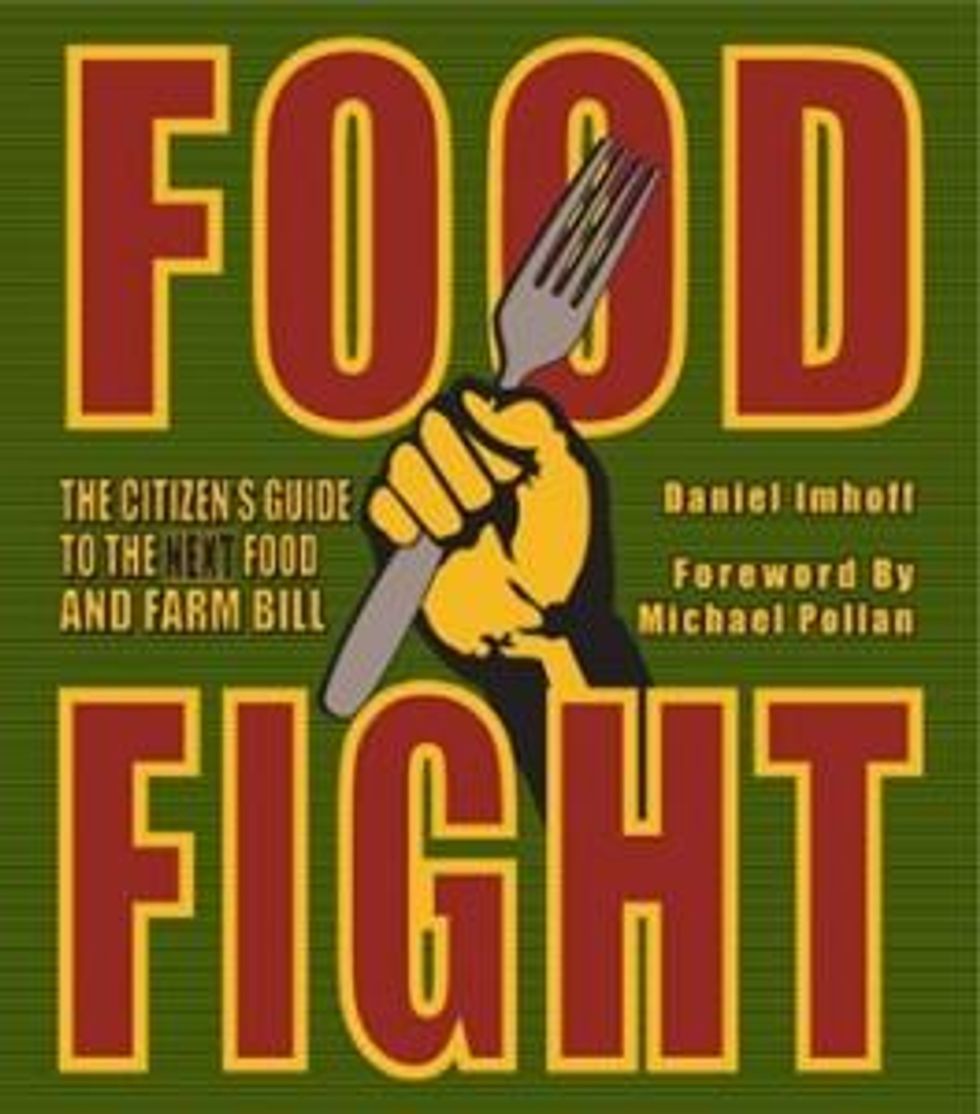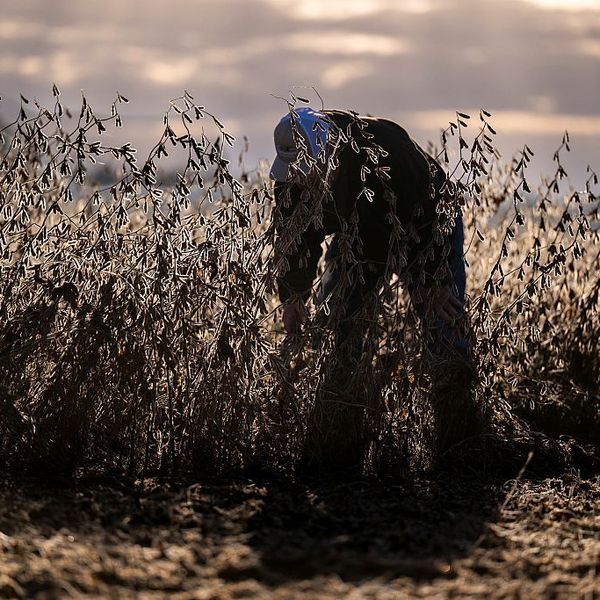Farm Bill 101: Pick a Food Fight!
Part history text, part socio-political commentary and part call to action, Food Fight: The Citizen's Guide to the Next Food and Farm Bill offers something for everyone from the seasoned agriculture advocate to the newcomer on the food systems scene. The newly re-issued book by Dan Imhoff comes just as the federal debate over the 2012 Farm Bill is heating up.
Part history text, part socio-political commentary and part call to action, Food Fight: The Citizen's Guide to the Next Food and Farm Bill offers something for everyone from the seasoned agriculture advocate to the newcomer on the food systems scene. The newly re-issued book by Dan Imhoff comes just as the federal debate over the 2012 Farm Bill is heating up.

The book is divided into three sections: Why the Farm Bill Matters; Wedge Issues; and Turning the Tables. To set the context, Imhoff summarizes the early history of the farm bill, describing the Dust Bowl, the Great Depression, and the overproduction of crops that led to its creation as a cornerstone of the New Deal. The history lesson continues with a short summary of the impact of the Green Revolution on farm bill policy, as well as the story of how the bill came to include hunger and nutrition programs, and the ebb and flow of conservation programs to incentivize environmental stewardship on the nation's farms and ranches. And because no discussion on the farm bill would be complete without discussing commodity subsidies, that's covered too.
After laying down the foundation, he devotes the rest of the book to strategic topics. He lays out a number of "wedge issues" that could change the terms of the farm bill debate--government deficits, the increasingly apparent impacts of climate change on agriculture, and other emerging ecological crises, the rise of the local food movement, food security concerns, and more.
The last few pages of the book are devoted to "Turning the Tables" and Imhoff offers a checklist of 25 ideas whose time has come--an aspirational menu for American agriculture. Finally, he provides a succinct activist tool kit with tips on organizing and a resource list of organizations across the country engaged in progressive advocacy on the farm bill and related issues.
Perhaps my favorite quote from the book--maybe because I can relate to it-is this: "I confess, I am a reluctant policy wonk. But these are the issues of our times. If Americans don't weigh in on the Farm Bill, the agribusiness lobbyists will be more than happy to draft the next one for us as they have done for at least 30 years."
The book is available online at Watershed Media where you can also see a number of other of Imhoff's books. You can also order it on the action-oriented Food Fight site that features farm bill-related events, news and a "what you can do" section.
An Urgent Message From Our Co-Founder
Dear Common Dreams reader, The U.S. is on a fast track to authoritarianism like nothing I've ever seen. Meanwhile, corporate news outlets are utterly capitulating to Trump, twisting their coverage to avoid drawing his ire while lining up to stuff cash in his pockets. That's why I believe that Common Dreams is doing the best and most consequential reporting that we've ever done. Our small but mighty team is a progressive reporting powerhouse, covering the news every day that the corporate media never will. Our mission has always been simple: To inform. To inspire. And to ignite change for the common good. Now here's the key piece that I want all our readers to understand: None of this would be possible without your financial support. That's not just some fundraising cliche. It's the absolute and literal truth. We don't accept corporate advertising and never will. We don't have a paywall because we don't think people should be blocked from critical news based on their ability to pay. Everything we do is funded by the donations of readers like you. Will you donate now to help power the nonprofit, independent reporting of Common Dreams? Thank you for being a vital member of our community. Together, we can keep independent journalism alive when it’s needed most. - Craig Brown, Co-founder |
Part history text, part socio-political commentary and part call to action, Food Fight: The Citizen's Guide to the Next Food and Farm Bill offers something for everyone from the seasoned agriculture advocate to the newcomer on the food systems scene. The newly re-issued book by Dan Imhoff comes just as the federal debate over the 2012 Farm Bill is heating up.

The book is divided into three sections: Why the Farm Bill Matters; Wedge Issues; and Turning the Tables. To set the context, Imhoff summarizes the early history of the farm bill, describing the Dust Bowl, the Great Depression, and the overproduction of crops that led to its creation as a cornerstone of the New Deal. The history lesson continues with a short summary of the impact of the Green Revolution on farm bill policy, as well as the story of how the bill came to include hunger and nutrition programs, and the ebb and flow of conservation programs to incentivize environmental stewardship on the nation's farms and ranches. And because no discussion on the farm bill would be complete without discussing commodity subsidies, that's covered too.
After laying down the foundation, he devotes the rest of the book to strategic topics. He lays out a number of "wedge issues" that could change the terms of the farm bill debate--government deficits, the increasingly apparent impacts of climate change on agriculture, and other emerging ecological crises, the rise of the local food movement, food security concerns, and more.
The last few pages of the book are devoted to "Turning the Tables" and Imhoff offers a checklist of 25 ideas whose time has come--an aspirational menu for American agriculture. Finally, he provides a succinct activist tool kit with tips on organizing and a resource list of organizations across the country engaged in progressive advocacy on the farm bill and related issues.
Perhaps my favorite quote from the book--maybe because I can relate to it-is this: "I confess, I am a reluctant policy wonk. But these are the issues of our times. If Americans don't weigh in on the Farm Bill, the agribusiness lobbyists will be more than happy to draft the next one for us as they have done for at least 30 years."
The book is available online at Watershed Media where you can also see a number of other of Imhoff's books. You can also order it on the action-oriented Food Fight site that features farm bill-related events, news and a "what you can do" section.
Part history text, part socio-political commentary and part call to action, Food Fight: The Citizen's Guide to the Next Food and Farm Bill offers something for everyone from the seasoned agriculture advocate to the newcomer on the food systems scene. The newly re-issued book by Dan Imhoff comes just as the federal debate over the 2012 Farm Bill is heating up.

The book is divided into three sections: Why the Farm Bill Matters; Wedge Issues; and Turning the Tables. To set the context, Imhoff summarizes the early history of the farm bill, describing the Dust Bowl, the Great Depression, and the overproduction of crops that led to its creation as a cornerstone of the New Deal. The history lesson continues with a short summary of the impact of the Green Revolution on farm bill policy, as well as the story of how the bill came to include hunger and nutrition programs, and the ebb and flow of conservation programs to incentivize environmental stewardship on the nation's farms and ranches. And because no discussion on the farm bill would be complete without discussing commodity subsidies, that's covered too.
After laying down the foundation, he devotes the rest of the book to strategic topics. He lays out a number of "wedge issues" that could change the terms of the farm bill debate--government deficits, the increasingly apparent impacts of climate change on agriculture, and other emerging ecological crises, the rise of the local food movement, food security concerns, and more.
The last few pages of the book are devoted to "Turning the Tables" and Imhoff offers a checklist of 25 ideas whose time has come--an aspirational menu for American agriculture. Finally, he provides a succinct activist tool kit with tips on organizing and a resource list of organizations across the country engaged in progressive advocacy on the farm bill and related issues.
Perhaps my favorite quote from the book--maybe because I can relate to it-is this: "I confess, I am a reluctant policy wonk. But these are the issues of our times. If Americans don't weigh in on the Farm Bill, the agribusiness lobbyists will be more than happy to draft the next one for us as they have done for at least 30 years."
The book is available online at Watershed Media where you can also see a number of other of Imhoff's books. You can also order it on the action-oriented Food Fight site that features farm bill-related events, news and a "what you can do" section.

